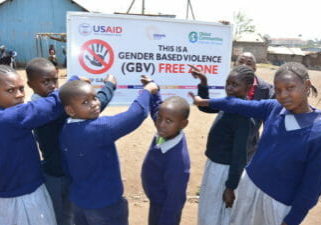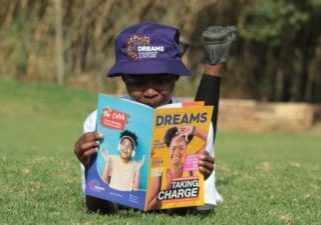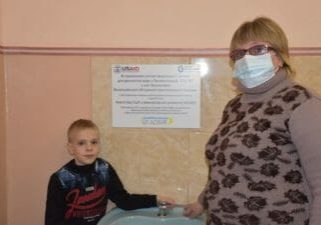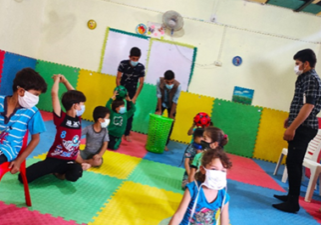News > Blog
Why We Need to Talk about Men on International Women’s Day
Published 03/07/2018 by globalcommunities
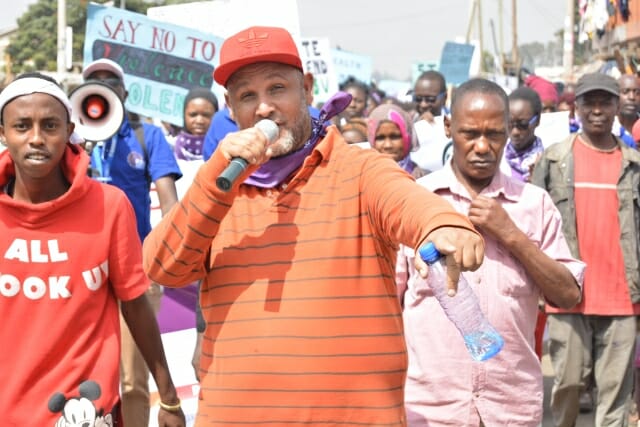
Why We Need to Talk about Men on International Women’s Day
By Betty Adera, Chief of Party for Global Communities’ DREAMS Initiative in Kenya | This article originally appeared on Medium.
#MeToo has brought the subject of sexual harassment and abuse of women and girls to the public consciousness in a way never seen before. Having worked at the community level supporting the rights of women and girls for more than 20 years, the stories coming out the #MeToo movement are all too familiar to me. Sexual harassment and violence against women is a pervasive issue and this global movement of women speaking out has demonstrated that no society is immune.
Globally, one in three women experience sexual or physical violence. What make this statistic even more somber is that the abuse is most likely from an intimate partner. In Kenya, where traditional attitudes toward women have been slow to change, the figure for women experiencing abuse is even higher. Nearly 40 percent of women suffer from physical or sexual violence.
The #MeToo movement has proven relevant in all societies and in all contexts — regardless of wealth, class, age, race, sexuality or educational attainment — because it is about power. In Kenya, as in most societies, men hold the preponderance of power. They are the holders of power within families, communities, workplaces, institutions and politics. The reality of this power imbalance means that men are the main perpetrators of violence against women and girls, as well as boys and other men.
Shifting the Focus
Rape, harassment, domestic violence, abuse — when directed upon women by men, we collectively refer to it as “gender-based violence.” It is useful term for talking about the problem of violence against women, but it is also a misleading term. Gender-based violence or GBV is viewed as a women’s issue. The word itself “gender” is synonymous with “women” and using the term gender unintentionally erases the role of men from the issue.
Men participate in a rally against gender-based violence in Nairobi last year.
For a long time, efforts to prevent GBV focused mainly on women. Women were either victims or survivors who needed to be protected, educated and empowered to stand up for their inalienable human rights. While these activities are still critical in the fight against GBV, we must shift the focus of our efforts onto men as well. While we tend to frame GBV as a women’s issue, the central role of men is obvious. They are the main perpetrators and violators. But when we view men’s roles solely in these terms, we can create a polarizing and unhealthy dichotomy.
Men who abuse women need to be recognized as perpetrators and held accountable for their crimes, but we must be careful not to villainize all men as a consequence. Men can be recruited and trained as allies and advocates in the prevention of violence. By teaching men and boys how to examine the social norms and belief systems tell them it is okay to subjugate women, we can start to change attitudes and behaviors, not just among individual men, but among communities as a whole.
Male Agents of Change
The goal of the DREAMS initiative is help girls develop into Determined, Resilient, Empowered, AIDS-free, Mentored, and Safe women. Supported by the U.S. President’s Emergency Plan for AIDS Relief (PEPFAR), the Bill & Melinda Gates Foundation, Girl Effect, Johnson & Johnson, Gilead Sciences, and ViiV Healthcare, DREAMS aims to reduce HIV infections among adolescent girls and young women in 10 sub-Saharan African countries.
Male Agents of Change during a recent forum in Nairobi.
As program director for the DREAMS initiative in Kenya, we are working to prevent and reduce HIV and keep women and girls safe from abuse. Gender-based violence has been linked to the rise of HIV among young women in Kenya — women between 15 and 24 years old are four times more likely to be infected than men in same age group. Under the DREAMS program we work directly with adolescent girls and young women between 10 and 24 years of age in some of the most vulnerable and under-resourced communities in Nairobi. The program works to strengthen their skills and knowledge regarding healthy sexual behaviors including abstinence and delayed sexual debut, prevention of gender-based violence, drug and alcohol abuse and positive health-seeking behaviors. But working with women and girls is only half of the story, DREAMS is also reaching out and engaging with men and boys to change their attitudes and behaviors toward women.
“I used to have a negative perspective of women and girls. I believed their place was in the kitchen, but I have been able to change that mindset and I’ve been able to believe, indeed, that women and girls can play a big role in creating an impact in our society.”
These are the words of Benjamin Sidori — a soft-spoken, but self-confident young man from Pumwani, an informal settlement near Nairobi. Sidori is a male “agent of change” and in this role he works to influence his male peers examine their attitudes about male superiority and gender equality. Sidori is one of 28 agents of change who have been trained through DREAMS. Together, they have counseled more than 1,000 men. These “man talks” not only cover the topic of violence against women, but include discussions on positive parenting and fatherhood, HIV prevention, substance abuse and how to promote health seeking behaviors.
Transforming Gender Norms
A big part of what we are trying to do by engaging men and boys is to transform gender norms. We asking these men to look at the social construction of masculinity — the beliefs, attitudes and messages that are being reinforced in their communities — and challenge these traditional definitions of manhood. In a highly patriarchal society like Kenya, women have vastly less social, economic and political status than men. As a result men listen to and are influenced by other men. Since men are socialized by other men, we must recruit and train individual men to change their beliefs and behaviors so we can instill those same changes to the wider community. Men who have been transformed can influence their peers to change their behaviors as well and not just refrain from violence themselves, but to also become advocates against GBV in their communities.
David Odhiambo, another agent of change explains, “It is necessary that men discover themselves, for change begins with individuals. If one undergoes transformation, your family becomes a role model and the whole society benefits.”
Male Agents of Change participate in a training on gender norms.
This effort includes reaching out to boys at an early age to deconstruct the harmful behaviors attached to traditional ideas of masculinity. Boys treat girls the way they have seen their father treat their mother or other men treat women. Through DREAMS, we provide training for boys aged 10–17, particularly those who have grown up around GBV. The aim is to reach younger boys before GBV becomes part of their lives, so that they can recognize, learn and prevent violent behavior against women and girls. We also work to socialize boys so that they can navigate important life topics in addition to GBV, including sexual health, drugs, education and how to end longtime cycles of pathology. These trainings aim to offer men and boys a different model for masculinity that does not involve the denigration of women — a model that eschews violence in all forms, that rejects the heinous notion of male sexual entitlement, and that discourages risk-seeking behaviors.
Men and Women Working Together to EndGBV
Women’s equality has been slow to gain ground in Kenya. Many communities are still patriarchal and conservative, with women having no authority over their lives. To combat GBV, we need to empower women and girls socially, economically and psychologically to be able to stand up for their full unalienable human rights. And while the advocacy and action of women is paramount in changing societal attitudes and securing true gender equality, men and boys also have a critical role to play.
We must remember that men are victims of male violence as well. They are direct victims of physical and sexual abuse. They are also indirect victims, as they witness and experience the violence perpetrated against their mothers, sisters, daughters and friends. Studies show that men who exhibit violent behaviors often had violent upbringings themselves. Violence in the household is also associated with higher rates of substance abuse, poorer health outcomes and greater financial and economic burdens. Violence against women touches us all regardless of gender and as a result we must work together ensure all people — women and men — can live safe, empowered and resilient lives.

